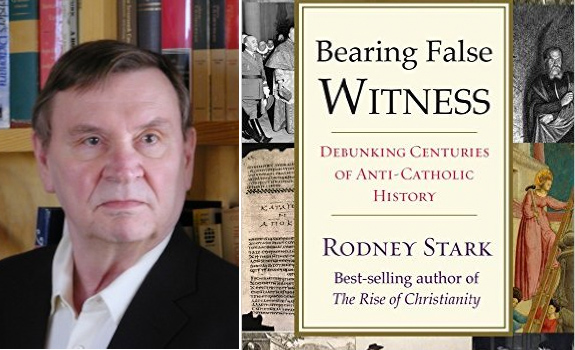
For a change, RW turns to historical trends in religion, namely the phenomenon of anti-Catholicism as documented by Baylor ISR’s co-director Rodney Stark in his new book Bearing False Witness (Templeton Press, $19.57). The book covers topics ranging from myths about Catholic origins and the “lost” Gospels to Catholicism’s attitudes concerning slavery, science, and capitalism. We briefly interviewed Stark about his book in early December.
RW: There have been other books on anti-Catholicism, but Catholics have usually written them; as a non-Catholic, what interested you enough about this subject to write a book on it?
Stark: I kept running into these dreadful lies, and they not only prompt anti-Catholicism, they badly distort history. I became concerned that so many of them are taken for granted by educated people.
RW: The book sets out to debunk stereotypes and other popular myths about Catholicism throughout history, such as about the church’s role in the Inquisition and the Crusades. What myth did you uncover that was the most surprising to you during your research?
Stark: Until I was faced with overwhelming data, it was inconceivable to me that the Inquisition was other than a dreadful, murderous institution. That it was, in fact, a force for moderation was inconceivable to me. But, the fact that the witch-hunts that swept through the rest of Europe were prevented in Italy and Spain by the Inquisition is undeniable. And that was only one of its good deeds.
RW: The role of the church in World War II and its complicity or at least passivity in the face of persecution of Jewish people has been the subject of several popular books, but you argue that the church was unfairly attacked on this front; can you explain that?
Stark: The overwhelming testimony by major Jewish figures is that the church opposed Hitler and managed to save a lot of Italian Jews. The lie about Hitler’s pope began in Moscow.
RW: Why do you think these myths have been so entrenched throughout history?
Stark: Because during the great religious wars, Protestant England and Holland put out a lot of anti-Catholic propaganda—I include a picture published in Holland in 1598 of a Spanish don feeding Indian children to his dogs. Unfortunately, this propaganda lived on, sustained by Protestant anti-Catholicism. Remember that English Catholics could not enroll in either Oxford or Cambridge until 1871. And, English historians shaped American history.
RW: Anti-Catholicism has been called the last acceptable prejudice; do you think it continues today?
Stark: Far less. But, the widespread credence given to Hitler’s pope charges, to the Crusades as Western colonialism instead of what they were, wars against Muslim colonialism, and to the rest of the false history I address causes good people to think there are good reasons to be anti-Catholic.
RW: In your conclusion, you note that anti-Catholicism has decreased significantly among Protestants, including Baptists, and cooperation and even a sense of unity has grown. What do you think that says about Protestants? Are theology and distinctive Protestant traditions just less important to them?
Stark: One need not place any less importance on Protestant doctrines to disdain anti-Catholicism. Religious tolerance is a virtue, not a sign of irreligion.